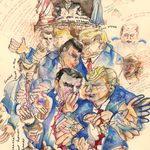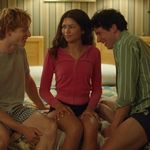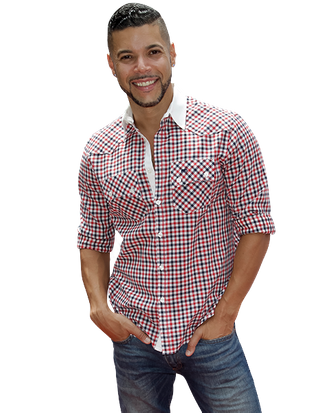
We’ve been looking back all week at the hugely influential 1994–95 network-television season, which found new shows Friends and ER hobnobbing on the same schedule with Seinfeld, The Simpsons, and The X-Files. We’ve counted down the season’s 100 best episodes, presented an oral history of the first season of Party of Five, tested your Friends knowledge with an SAT-style exam, and so much more. But right now we are in the middle of our My So-Called Life Power Hour and it’s time to talk to Wilson Cruz, who played Angela Chase’s pal Rickie Vasquez.
When My So-Called Life premiered, there was no one on TV like Rickie Vasquez. Played by Wilson Cruz, Rickie was a step apart from everyone else onscreen: an LGBT teenager of color with a Technicolor wardrobe, hair rising three inches above his head, and eyeliner that could ward off evil spirits, but he just wore it because he liked how it looked. Cruz’s story and Rickie’s twisted together, each inspiring the other. Cruz was thrown out of his house when he came out; less than a year later, he shot an episode in which the same thing happened to Rickie. Cruz, now a national spokesperson for GLAAD, talked to Vulture by phone about his time on My So-Called Life, how television has changed for LGBT youth since the show aired 20 years ago, his role on Fox’s upcoming Red Band Society, and ’90s fashion faux-pas.
What do you remember about auditioning for the show?
You’re taking me back! I actually remember it pretty clearly. I remember getting the script from my agent at the time, and I remember she said something to me like, “Give this a read and let me know what you think. I think there’s a character in here that you’ll relate to.” And I was like, okay, there’s a lot of code in there, but sure. And I read it, and remember honestly feeling like somebody had followed me around during high school.
I remember having a very distinct idea of what this person looked like and dressed like, so when I went in for Mary Goldberg, the casting director, I remember wearing these red jeans and this rainbow-striped shirt, and having my hair as high as I could possibly get it. I don’t know, Patrick Norris, the costume designer, and I talked about it, the idea that he was influenced by Prince, Michael Jackson, and Lenny Kravitz. I remember there were other guys in the waiting room who were, like, in khakis and boat shoes. And I was like: You SO don’t know who this person is.
I remember going into Mary Goldberg’s office and saying to her, before we even read, “I just want you to know how incredibly important this would have been for me if I had seen this on TV when I was a kid.” And we read the scene, and then she said, “I was going to tell the writers and producers what you said, but I’m just going to have you tell them yourself.” So I met with Winnie Holzman and Ed Zwick, and then there was, I think, three auditions, and then we went to network. This was, by the way, the first pilot I’d ever auditioned for. So I didn’t even know how the whole process worked. So they said, “You read for these network execs,” and I walked in and there were 20 people in the room. I wasn’t prepared for that!
How old were you at the time?
I was about to be 19.
And you already had that perspective, that you wished something like My So-Called Life and a character like Rickie had been on TV when you were a kid?
Oh, absolutely! Let me speak for myself, I think I wanted to see people who looked like me on TV. I wanted to see people who had similar experiences as I had, growing up. There was nobody on television when I was a teenager who I could relate to. There were aspirational figures. When I was a teenager, in the ’80s, it was Dynasty. It was Beverly Hills, 90210. And those were fantasies. Those weren’t reflective of my experience. And I think we all want that, we all want to see ourselves, our story told, something to relate to, to help us and know that we’re not freaks, that our experiences aren’t odd. If you were to turn on the TV in 1986, ’87, you wouldn’t see anybody having, I guess, a low-to-middle-income person of color experience. And you definitely wouldn’t have a young LGBT person or their story told. The experience of being invisible in our culture has ramifications that I don’t think any of us can really understand. I think that we need to see ourselves, in a lot of ways. It helps us know that we belong. And I think Rickie did that for a lot of people. I know that even for me, playing him, it helped me feel that I was validated in a lot of ways. And everything I heard from people who watched it was validating for me. So it was powerful in a lot of ways, and I think even going in to see Mary, even reading the pilot script initially, I knew that it was really special. As much as I wanted to play the role, I also knew I would have loved to have to watched it.
I’ve read that some elements of Rickie’s life, like how his parents kicked him out of the house when he came out to them, were inspired by things that had happened to you. What was that process like?
I don’t want to overstate it too much. I think a lot of it was that Winnie Holzman had a very open and nurturing relationship with all of us. And through that relationship, she got to know all of us really well, and she got to know about our lives, and a lot of that seeps into the storytelling. Winnie and I have talked about it, too, which is that, we don’t know which — somehow she doesn’t remember me telling her that I had been kicked out of my house, and I don’t necessarily remember not telling her, but I think she had already known that Rickie was going to be thrown out of his house. And this happened a lot with of the show: We would know that she wanted a character to go through something, and one of us would tell her, “That happened to me.” So a lot of it was osmosis. It was very weird! It was this perfect relationship she created with all of us that allowed for her creative senses to be fed. And then I think when I got the script where Rickie got thrown out, we had a long talk about it, and I told her what had happened to me.
How much time passed between when you were thrown out of your house and when you filmed the episode when the same thing happened to Rickie?
It wasn’t even a year. I think we filmed that episode in October, and it aired in December of ’94. And I had been thrown out of my house in the end of ’93, at Christmas. And there was three months, three or four, between when I had been thrown out and we started production on the series. That’s when I was homeless, staying on friends’ couches and in my car and whatever. It was all still pretty raw and real when we were in production.
What was it like to shoot those scenes so soon after you’d gone through that experience in real life? In hindsight, are you glad the time between the two was so short, or do you wish you’d had a bit more distance?
I think that going through it on the show helped me heal in a lot of ways. There’s something to be said about being able to go through it and get through to the other side. It was incredibly cathartic. And it really let me let go of it in a lot of ways. And I’ve talked about this before, that because of that episode — my father and I were still not speaking when we were filming that episode — and the reason why my father and I were able to reconcile was because he watched it on TV. And it is because of that episode that he called me, and we were able to have a real conversation. So, in a lot of ways, I have that show to thank for my relationship with my father today. I was able to walk through it, to let it go, to reconcile with my father, and hopefully give voice to an experience that a lot of young people still have. We still are seeing, to this day, hundreds of thousands of LGBT young people who are thrown out of their homes because of the fact that they’re LGBT. And that was 20 years ago. The fact that we’re still seeing and hearing about it today is really upsetting, but I do think that we are better able to talk about it than we were 20 years ago. And I think a lot of that comes from what Winnie wrote down on the pages.
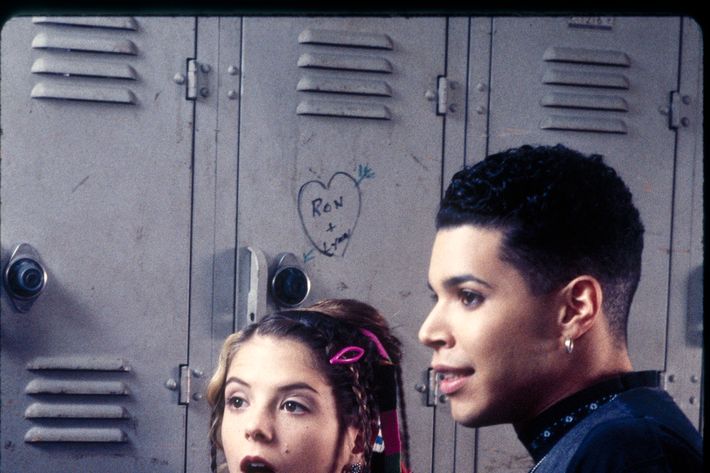
Did you sense from the reaction you got from fans at the time that Rickie was really connecting with other young people?
This was before the internet. I think the internet had been born three seconds before we aired. So today, I would get a message on Facebook. Then, people, we still were dealing with snail mail. I remember getting a letter at the production office. God, I’m such a sap! I still have the letter. I remember getting a letter from a young boy from the Midwest, and he just said how important the show was to him, and how he didn’t — he thought that he was the only person in the world who was having these feelings, and he was afraid that he was going to do something to hurt himself. And the thing about it was, yes, the letter was very moving. But the thing that was really heartbreaking was that you could see where his tears fell on the page. [Long pause.] I can’t believe I’m still crying about this letter. And I wouldn’t get that today. I would have gotten some words on the computer screen. I wouldn’t have seen how his hand was shaking, how he could barely write the words. How the tears had fallen on the page. So I remember that really vividly.
But you know, the other thing about it is that a lot of the kids who were moved or affected by the show, in regards to Rickie, were teenagers, and they weren’t brave enough to write a letter or didn’t know where to send it. So I ended up meeting a lot of them after they became adults. When I would be out at a bar and they’re in their 20s. I remember right around the time I was doing Rent in New York, in ’97 or ’98, I think some of them were coming of age at that point. And people [were] coming up to me to say, “When I was a teenager, that show was my life. I’d never seen anyone like that on TV.” I remember how gratifying that was, for me to hear them and for them to be able to have that conversation with me. So it’s really interesting. For Claire [Danes, obviously], for A.J. [Langer, who played Rayanne], it was easy for girls to come up to them and say, “Hey, I relate to you.” It was not going to be easy for a teen gay boy to come up to me with his parents and tell me that they could relate to me, because he was probably still deeply closeted or didn’t even know what he was feeling. So I had that experience five or six years after they did. It’s a very fascinating experience.
Do you see any characters on television today whom you think wouldn’t exist if it hadn’t been for Rickie?
You cannot overstate, I don’t think, the impact of a show like Glee on a generation. There’s character after character after character on that show, you start with Kurt and go straight through to Unique, and Naya Rivera’s character, and how they really seamlessly told those stories and still entertained people. And I think Chris Colfer has handled himself so beautifully and so responsibly, and I’m really proud of them. So that’s the first thing that comes to mind. But television, in a lot of ways, is a very different place than it was 20 years ago. At GLAAD we put out a TV and film report every year, and TV is blowing mainstream films away in terms of LGBT content. In mainstream films, we’re basically invisible. On TV, we’ve made huge strides in the way LGBT people are depicted. You look at a show like The Fosters, we would never see anything like that 25 years ago. Modern Family is obviously another one. So we’ve made great strides. Do I think that there’s a lot more work to be done? Absolutely. And that is about how we diversify the way LGBT people are represented. We still need to see more people of color, obviously. We need to see more age ranges of LGBT people. I think the last time we had a senior citizen LGBT person, a regular character, was on Brothers and Sisters. That story can still be told. We still need to see people who are living with HIV and AIDS in a real way, on TV. There are so many stories that are still left to be told. And it looks like we’re going to see them on television before we see them in the movies.
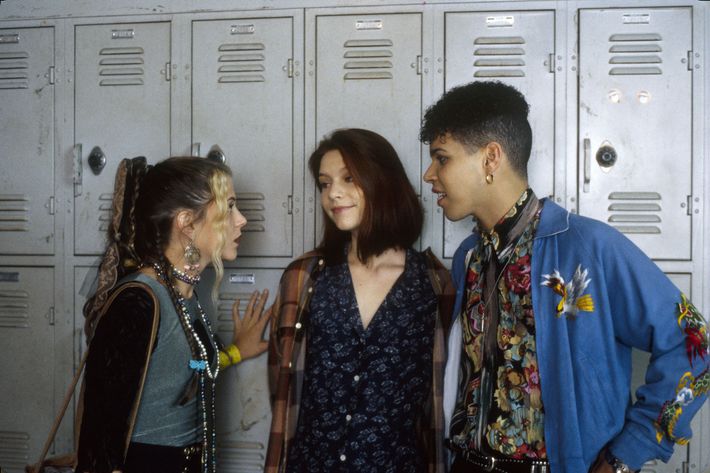
On a lighter note, is there anything especially ’90s about the fashion on the show that you look back on now and are totally embarrassed by, or just think is hilarious?
I mean, did you see my hair on that show? I don’t even know where to begin. But it was perfect for him. That’s who he was. Patrick Norris and I really were specific about who this person was and who were his influences. It was very much of its time. The other thing about Rickie’s dress was that the way he dressed was the first way that he explored the fact that he was different from everybody else. And it was the one way he celebrated it, and he allowed himself to dress that way and say, “Yeah, I’m different from everybody else, and I’m going to exaggerate it as much as I can. I’m going to be in on the joke.” But yes. The flannel. The Buffalo Tom music. It was very much of its time. But at the same time, you could change the clothes, change the music, leave the scripts exactly as they are, and set it in any decade. Because the experiences that everyone is having are universal.
They really do talk like actual teenagers. They don’t have that quippy, Amy Sherman-Palladino thing — which is also fun to listen to but doesn’t have that authentic teenage ring to it.
Winnie Holzman had the voice of a teenager in her head. She had it down for sure.
Do you have any favorite Angela Chase voice-overs? Any lines stick with you?
I know that my favorite one was from “Self-esteem.” That’s the one with the fashion show? And it’s something along the lines of, “We’re all beautiful. Maybe even me.” That and, of course, “School is a battlefield. For your heart.” [There were] so many of those voice-overs that I loved, I have to say.
What can you tell me about your new show, Red Band Society?
It stars Octavia Spencer, and it takes place in the pediatric ward of a hospital. And very much like MSCL, there is a group of teenagers, and it’s really about their lives in this pediatric ward. And my character used to be a patient at the hospital and was inspired to become a nurse himself … It’s really about that moment in all of our lives when somebody we hardly know becomes somebody we can’t live without. That is who these kids become to each other, and who we, the staff, become to them. I’m kind of like their older sibling who doesn’t really allow them to get away with anything. And that’s who I am in real life, too.
Anything else about your time on MSCL that I didn’t ask you about that’s important to you?
You got me to cry, I think you got it all!


